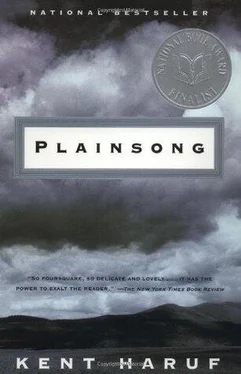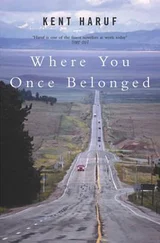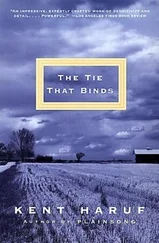I’m not crazy yet, she said. I don’t think I am. Do you think I’m crazy?
No.
No. I haven’t gotten there yet. I don’t think I’m going to now. She stared off fixedly across the room. I thought I would but I don’t think so now. It’s just that I don’t know what to do about what I’m thinking. I think all the time and I can’t seem to stop, but I don’t know what to do about that yet either. She was looking at them again. Isn’t that a nice fix to find yourself in?
Maybe you should go outside more, Ike said.
Do you think that would help me?
It might.
But when do you think you will be coming home again? Bobby said.
I can’t say about that. You mustn’t rush me. I need time. Don’t ask me that now, all right?
All right.
She smiled at him sadly. Thank you, she said.
Mother, do you want us to pick up for you? Ike said.
Why? What do you mean?
The things here. In this house. He looked around the room and waved his hand.
Oh. No. That’s nice of you. But I’m feeling kind of tired. She pulled the neck of her robe together. I think I’ll lie down. I feel kind of sick.
You should see the doctor.
I know. Would you mind if I lie down now?
You look tired, Mother.
We’ll come back later, Bobby said.
Can we bring you anything? Ike said.
She looked into their faces. Well. I don’t know. I am out of coffee, she said. Could you get me some coffee?
Yes.
You could charge it at Johnson’s in my name.
She stood up and went back slowly to the bedroom, and they went outside and talked about it between themselves on the street curb and then rode downtown to Johnson’s grocery store on Main Street and went back along the wood floor to the ranked shelves of coffee that were arranged by brand and price and chose a green can that looked familiar to them and charged it to their mother at the register. Afterward they went over to Duckwall’s, still on Main Street in the middle of the same block, and stood in front of the perfume counter, debating for fifteen minutes, while the clerk behind the glass case showed them little bottles.
How much is that one? Ike said.
This one here?
Yes.
This one is five dollars.
Finally they chose the one they could afford out of their paper-route money and from what was left of the dollars Raymond McPheron had given them for helping work cattle — a little blue bottle that said Evening in Paris on the label and had a very sweet scent and a silver stopper that closed it, and they still had enough money left over to buy a small box with a clear lid that contained a dozen round soft vari-colored balls of bubble bath. They had the clerk, the middle-aged woman, wrap the two boxes in paper with a bow.
Then they rode back to her house on Chicago Street. By now it was late afternoon and getting cold outside. The long shadows were reaching across the street. They waited a long time before she answered their knock, and when she came to the door she looked as though she had risen from a deep sleep.
They offered the can of coffee to her and she took it fumbling and then they held out the two boxes from Duckwall’s.
Did you buy these too?
Yes.
What are they?
Open them why don’t you, Mother?
But what are they?
They’re for you.
She slowly untied the bows and unwrapped the bright paper and saw what was in the boxes. She began to cry then. The tears ran unregarded down her face. Oh, dear God, she said. She was crying. She hugged the two boys with the boxes still clutched in her hands. Oh God, what am I going to do about any of this?
Maggie Jones drove out to the McPherons’ on a cold Saturday afternoon. Seventeen miles southeast of Holt. Beside the blacktop there were patches of snow in the fallow fields, drifts and scallops wind-hardened in the ditches. Black baldy cattle were spread out in the corn stubble, all pointed out of the wind with their heads down, eating steadily. When she turned off onto the gravel road small birds flew up from the roadside in gusts and blew away in the wind. Along the fenceline the snow was brilliant under the sun.
She drove up the track to the old house set back off the road a quarter mile. Beside the house a few low elm trees stood leafless inside the yard that was closed in by wire hogfencing. When she got out of the car a mottled old farm dog scuttled up to her and sniffed her leather boots and she patted his head and went through the wire gate up to the house and knocked on the screen door. Above the steps was a little screened porch, the mesh mended in places with white cotton string where it had been torn or poked through with something sharp. Beyond was the kitchen. She went up the steps onto the porch and knocked again. She looked in, the kitchen was more or less orderly. The table was cleared of dishes and the dishes laid in the sink, but there were stacks of Farm Journals and newspapers loaded up against the far walls, and greasy pieces of machinery — cogwheels, old bearings, shank bolts — were set out on mechanics’ rags on each of the chairs except the two that were placed opposite each other at the pine table. She opened the door and hollered in. Hello? Her voice echoed, it died out in the far room.
She came back off the porch and out to the car. Now there was the far-off sound of a tractor muttering and popping, coming up from the pasture to the south. She walked down to it and stood around the corner of the horse barn out of the wind. She could see them now. Both brothers were on the tractor, Raymond standing up behind Harold, who sat behind the wheel driving an ancient red sun-faded Farmall with the canvas wings of the heat houser bolted over the block onto the fenders for protection from the wind, pulling an empty flatbed hay wagon. They’d been feeding cattle out in the winter pasture, hay bales and pellets of cottonseed cake, scattering the cake in the feed-bunks. They jolted through the gate and stopped and Raymond got off and swung the gate closed and climbed back on, and they came banging and clattering past the corrals and past the loading chute up to the barn. The lid on the tractor’s exhaust stack flapped with bursts of black smoke, then they shut the engine off and the lid dropped shut and suddenly Maggie Jones could hear the wind again.
She stepped away from the barn and stood waiting for them. They got down and approached her slowly, calmly, as deliberately as church deacons, as if they were not at all surprised to see her. They moved heavily in their winter coveralls and they had on thick caps pulled low and cumbersome winter gloves.
You’re going to freeze yourself standing there, Harold said. You better get out of this wind. Are you lost?
Probably, Maggie Jones said. She laughed. But I wanted to talk to you.
Oh oh. I don’t like the sound of that.
Don’t tell me I scared you already, she said.
Why hell, Harold said. You probably want something.
I do, she said.
You better come up to the house, Raymond said.
Thank you, she said. At least one of you is a gentleman.
They went back to the old house across the frozen lot in the wind. The dog came out to meet them and sniffed at her again and retreated once more into the open garage. They mounted the steps to the house. On the little porch the brothers bent over and unbuckled their manure-caked overshoes. Go on in, Raymond said. Don’t wait on us. She opened the door and entered the kitchen. The house was not warm but it felt better out of the wind. They came in after her, closed the door and took their gloves off and set them out on the counter where they looked as stiff as firewood curled open in the permanent shapes of their hands. They unzipped the tops of their coveralls. Underneath they wore black button-up sweaters, flannel shirts and long underwear.
Читать дальше







